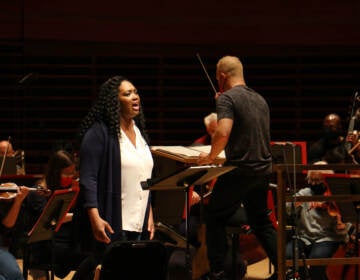Syrian-American hip-hop artist bridges rap and Arabic poetry
The Syrian-American poet and hip-hop artist Omar Offendum spent this week in Philadelphia and will perform at the International House this Sunday.
Listen 2:04The Syrian-American poet and hip-hop artist Omar Offendum spent this week in Philadelphia, talking and rapping to students at Bodine High School for International Affairs in the Northern Liberties neighborhood. He was teaching that classic Arabic poetry and rap are really not so different.
It’s not such a heavy lift: African-American rap music is often laced with references to Islam (20 years ago, for example, Biggie Smalls rapped “Quick fast, like Ramadan,” on “Kick in the Door” from his “Life After Death” album). Philadelphia urban culture, in particular, is thoroughly permeated with Arabic and Islam, as Offendum — who is based in Los Angeles — discovered on a SEPTA bus.
The bus driver was wearing a hijab, so he greeted her in Arabic — “As-Salaam Alaikum” — and she responded with the same.
“She responded so casually, so nonchalantly, like it was an everyday thing. She didn’t think twice,” said Offendum. “Whereas in LA, when I see someone in the hijab, and I say, ‘As-Salaam Alaikum,’ there’s a moment there, where it’s like, ‘OK, were minorities here, and we’re sharing a moment.’ In Philadelphia, it’s just another person you’re saying hello to.”
Offendum was in town preparing for a Sunday concert presented by Intercultural Journeys. He was also doing some outreach. On Thursday, he appeared at the University of Pennsylvania’s Museum of Archaeology and Anthropology, presenting new material based on his reaction to that institution’s collection of ancient Syrian artifacts.
At Bodine High, he spoke with a ninth-grade English class about his experiences as a Syrian-American; about the discrimination — both casual and overt — he experiences as a Muslim in the post-9/11 world; and about the ongoing Syrian civil war. The urgency of the war and the plight of its victims dominate much of his creative output right now.
“I do a lot of work to raise awareness of Syrian refugee relief. It’s the biggest refugee crisis in the world,” he said. “It can be stifling, creatively. It’s a traumatic, dark place. But when I was growing up [in Washington, D.C.] nobody knew where Syria was. I mostly heard lame jokes about breakfast cereal.”
Arabic is Offendum’s first language, and he blends English and Arabic fluidly in his songs and poetry. “I’m coding my experience into the lexicon of rap,” he said. Part of that experience was being raised in an Arabic culture that reveres poetry. He has translated classical Arabic poetry into English rap: “The Damascene Poem” by Nizar Qabbani, Syria’s best-known poet.
I am in love – but I am aware of the fact
That certain kinds of love
Can slaughter you in wrath
I am a Damascene if you dissect me into halves
You will have but grapes and apples falling in your path
And vice-versa: on “SyrianamericanA” (2010) Offendum translated the Langston Hughes poem “The Negro Speaks of Rivers” into a rap performed in Arabic.
I’ve known rivers:
I’ve known rivers ancient as the world and older than the flow of human blood in human veins.
My soul has grown deep like the rivers …
“That poem is powerful because he references the Euphrates and the Nile and the Congo, these rivers, these freshwater sources of life, which are basic things all people share,” said Offendum. “He is able to frame the common humanity that bonds us all, in a really beautiful way.”
It was also helpful that Hughes’ words (aside from references to Mississippi and Abraham Lincoln) already had Arabic equivalents.
Offendum normally raps over programmed beats, but, for his performance at the International House this Sunday, he will be backed up by a local trio of standup bass, Latin percussion, and the oud — a stringed Arabic instrument similar to the lute.
“Having the ambient music of the oud elevates the status of the poetry when it’s being performed in really interesting ways,” he said. “It’s something I’ve enjoyed doing a lot more recently.”
WHYY is your source for fact-based, in-depth journalism and information. As a nonprofit organization, we rely on financial support from readers like you. Please give today.





